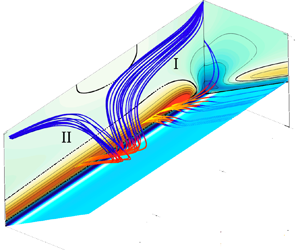Article contents
Ascending–descending and direct–inverse cascades of Reynolds stresses in turbulent Couette flow
Published online by Cambridge University Press: 08 November 2021
Abstract

The interaction between small- and large-scale structures and the coexisting bottom-up and top-down processes are studied in a turbulent plane Couette flow, where space-filling longitudinal rolls appear at relatively low values of the Reynolds number  $Re$. A direct numerical simulation database at
$Re$. A direct numerical simulation database at  $Re_\tau =101$ is built to replicate the highest
$Re_\tau =101$ is built to replicate the highest  $Re$ considered in recent experimental work by Kawata & Alfredsson (Phys. Rev. Lett., vol. 120, 2018, 244501). Our study is based on the exact budget equations for the second-order structure function tensor
$Re$ considered in recent experimental work by Kawata & Alfredsson (Phys. Rev. Lett., vol. 120, 2018, 244501). Our study is based on the exact budget equations for the second-order structure function tensor  $\left \langle {\delta u_i \delta u_j} \right \rangle$, i.e. the anisotropic generalized Kolmogorov equations (AGKE). The AGKE study production, redistribution, transport and dissipation of every Reynolds stress tensor component, considering simultaneously the physical space and the space of scales, and properly define the concept of scale in the inhomogeneous wall-normal direction. We show how the large-scale energy-containing motions are involved in the production and redistribution of the turbulent fluctuations. Both bottom-up and top-down interactions occur, and the same is true for direct and inverse cascading. The wall-parallel components
$\left \langle {\delta u_i \delta u_j} \right \rangle$, i.e. the anisotropic generalized Kolmogorov equations (AGKE). The AGKE study production, redistribution, transport and dissipation of every Reynolds stress tensor component, considering simultaneously the physical space and the space of scales, and properly define the concept of scale in the inhomogeneous wall-normal direction. We show how the large-scale energy-containing motions are involved in the production and redistribution of the turbulent fluctuations. Both bottom-up and top-down interactions occur, and the same is true for direct and inverse cascading. The wall-parallel components  $\left \langle {\delta u \delta u} \right \rangle$ and
$\left \langle {\delta u \delta u} \right \rangle$ and  $\left \langle {\delta w \delta w} \right \rangle$ show that both small and large near-wall scales feed the large scales away from the wall. The wall-normal component
$\left \langle {\delta w \delta w} \right \rangle$ show that both small and large near-wall scales feed the large scales away from the wall. The wall-normal component  $\left \langle {\delta v \delta v} \right \rangle$ is different, and shows a dominant top-down dynamics, being produced via pressure-strain redistribution away from the wall and transferred towards near-wall larger scales via an inverse cascade. The off-diagonal component shows a top-down interaction, with both direct and inverse cascades, albeit the latter takes place within a limited range of scales.
$\left \langle {\delta v \delta v} \right \rangle$ is different, and shows a dominant top-down dynamics, being produced via pressure-strain redistribution away from the wall and transferred towards near-wall larger scales via an inverse cascade. The off-diagonal component shows a top-down interaction, with both direct and inverse cascades, albeit the latter takes place within a limited range of scales.
JFM classification
- Type
- JFM Papers
- Information
- Copyright
- © The Author(s), 2021. Published by Cambridge University Press
Footnotes
Present address: Aix-Marseille Univ., CNRS, IUSTI UMR 7343, 13013 Marseille, France.
References
REFERENCES
- 9
- Cited by



